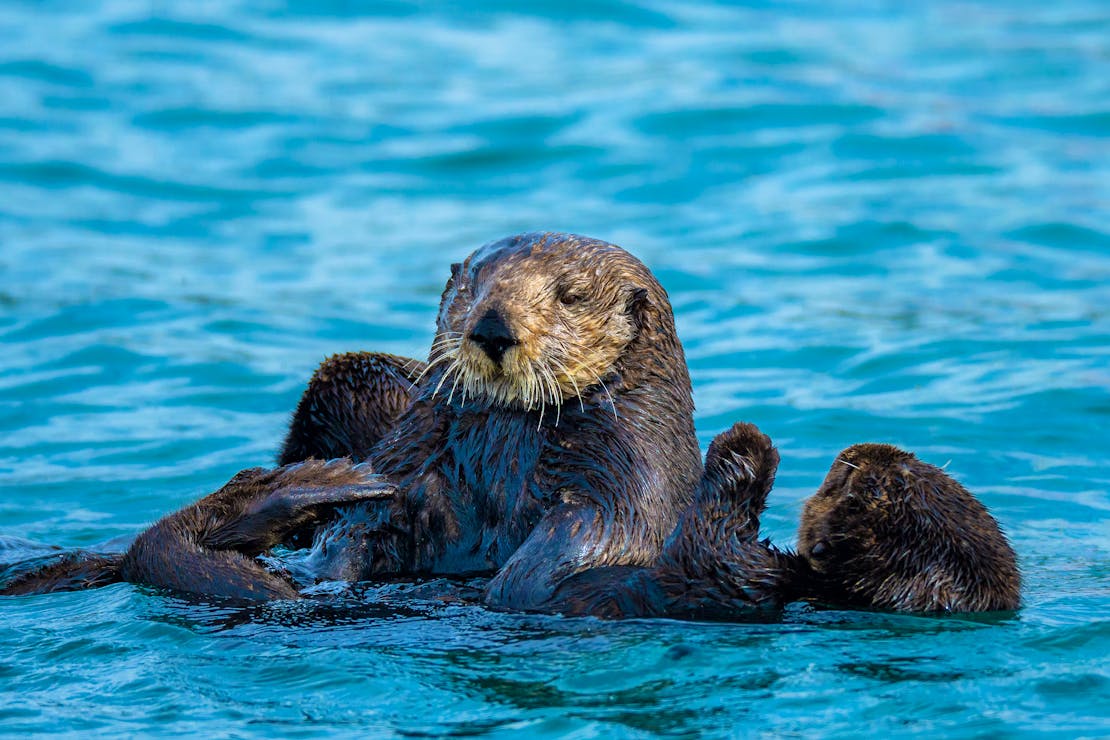Defenders of Wildlife and Sea Otter Savvy marked the 20th annual Sea Otter Awareness Week with a series of events focusing on the path to coexistence that reflects the challenge of managing human efforts to sustain wildlife and habitat diversity. The groups highlighted and celebrated the progression toward a more positive relationship between people and sea otters. Coexistence requires that many pieces come together and achieve balance within an ecosystem. Several presentations and events explored how these elements can coexist in the face of a changing climate, rising sea levels and increasing human populations along the West Coast.
The fur trade of the 18th and 19th centuries nearly drove California’s sea otter population to extinction. Ongoing conservation efforts are helping the species recover; however, sea otters continue to face challenges in populated coastal areas where pollution and disturbance from human recreational activities negatively impact their habitat and overall well-being.
Earlier this year, the California Legislature recognized the week-long awareness campaign in a resolution that also urged Californians to appreciate the value of sea otters along the state's coastal waters and to support protections for the species and its coastal habitat. The Resolution also recognized Defenders of Wildlife's and Sea Otter Savvy's role in organizing the events and education campaign over two decades.
In late July, the U.S. Fish and Wildlife Service released a sea otter reintroduction feasibility assessment, and groups began reaching out to and engaging with stakeholders about what restoring the species could mean for coastal areas. To help coastal communities understand the species’ potential impact in areas of its historical range to which it has not yet returned, Sea Otter Savvy developed its “We Were Here” sea otter program. This program created a stakeholder survey to gather perspectives, questions, ideas and concerns regarding potential sea otter reintroductions.
"Our groups view everyone as sea otter stakeholders,” said Andy Johnson, California Representative with Defenders of Wildlife. “The results from the survey will help governmental agencies and the sea otter research community decide on future sea otter conservation planning.”
Interested individuals can complete the sea otter stakeholder survey by visiting the "We Were Here" website.
"Various governmental and NGO entities have begun exploring how sea otters might be restored to these historical areas," said Gena Bentall, Sea Otter Savvy’s director and senior scientist. "It’s our job to encourage respect for all wildlife and teach people how to coexist with animals like sea otters that perform important functions within coastal habitats."
Sea otters (Enhydra lutris) are marine mammals that live along the Pacific coasts of Baja, North America and Russia. Southern sea otters (only in California) weigh between 45 to 65 pounds; northern sea otters can reach up to 100 pounds. They have a lifespan of 10 to 20 years.
Historically, sea otters numbered between 150,000 and 300,000 animals throughout the Pacific Rim. The southern sea otter population, which once consisted of approximately 16,000 animals, is hovering around 3,000 today.
Humans are the biggest threat to sea otter populations. Direct conflicts with humans through shootings, fishing gear entanglements and boat strikes, take a toll on individual sea otters, but oil spills and pollution and disease from the land pose major threats to the species.
For over 75 years, Defenders of Wildlife has remained dedicated to protecting all native animals and plants in their natural communities. With a nationwide network of nearly 2.1 million members and supporters, Defenders of Wildlife is a leading advocate for innovative solutions to safeguard our wildlife for generations to come. To learn more, please visit https://defenders.org/newsroom or follow us on X @Defenders.
Media Contact
News

Defenders Receives Advocacy Organization of the Year Award



